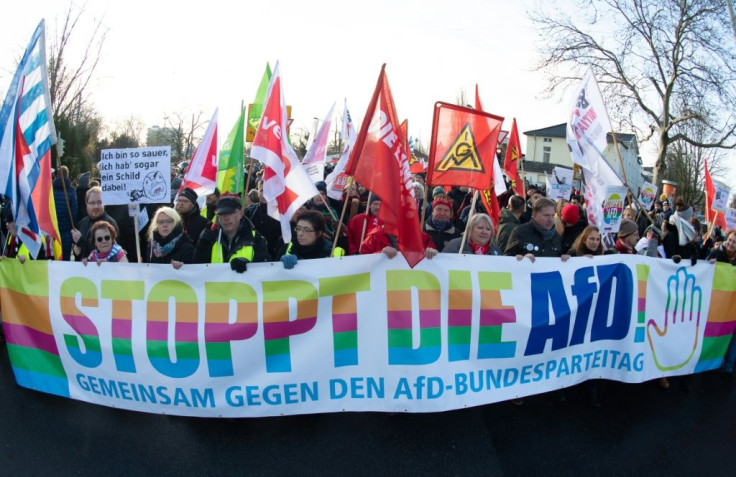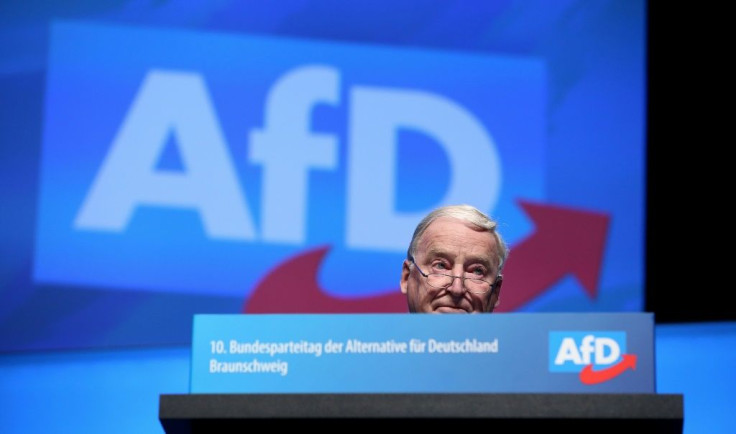Germany's Far-right AfD In Radical-moderate Leadership Compromise

Germany's far-right AfD party on Saturday elected a leadership duo backed by both its increasingly influential radical wing and moderates, at a congress hit by massive protests.
Former house-painter Tino Chrupalla, 44, replaces 78-year-old Alexander Gauland to join incumbent co-leader Joerg Meuthen, 58, at the top of the party.
Newcomer Chrupalla met with former Donald Trump advisor Steve Bannon in Berlin earlier this year.
While he is not a member of the radical faction Fluegel, his win underlined the growing influence of the group whose leadership has touted him as "one of the great representatives" of the former East Germany, the AfD's stronghold.
Ahead of the vote, Chrupalla told the congress that electing him along with Meuthen would set a "historic signal" as it is a team "with representatives from east and west and a leadership duo in which both academics and non-academics can identify".

The anti-migrant party's extremists have the upper hand after electoral gains in eastern regions in September and October that have caused widespread domestic and international alarm.
Illustrating the polarising effect the party has on Germany, 20,000 protesters gathered outside the congress hall in the city of Braunschweig in a noisy demonstration against what they call a racist party.
Crying "Get lost!" and "All of Germany hates the AfD", the protesters held up posters bearing slogans like "No place for Nazis" or "Stop the AfD".

The huge numbers turning up in the city "is a clear sign that no one in Braunschweig wants the AfD here," said Udo Sommerfeld, a spokesman for the anti-far-right protest.
On the eve of the congress, around a thousand protesters, all dressed in black, also marched through the centre of the city against the far-right outfit.
Wary of any negative association with the party, automaker Volkswagen, whose name is on the hall used by the AfD, has requested its logo be covered up.

The AfD, established just six years ago, is riven with personal and ideological rivalries.
Unlike his challenger Gottfried Curio, 59, Chrupalla has presented himself as a more serious candidate.
Yet he too has prompted outrage with his rhetoric.
Last month, he was booed in parliament after accusing Chancellor Angela Merkel of treating her voters as "underlings" with "micro-aggressions against everything German".
He has also called the "Islamisation of the West" a "reality", saying that one could qualify it as a replacement of the population.
Meuthen, a university professor from western Germany, meanwhile represents the more moderate wing of the party.
With 91 MPs, the AfD is now the third political force in the German parliament after the CDU and SPD.
But its support in opinion polls has stagnated at around 13 to 15 percent.
The AfD started out as a eurosceptic party but became increasingly anti-migrant and opposed to Merkel's refugee policy which saw more than a million asylum-seekers arrive since 2015.
The radical Fluegel in particular has drawn scrutiny as it has attacked one of the foundation stones of Germany's post-war political culture -- atonement for its Nazi past.
Hoecke notoriously described Berlin's Holocaust Memorial as a "memorial of shame", while his colleague Andreas Kalbitz has been accused of association with neo-Nazi organisations.
© Copyright AFP {{Year}}. All rights reserved.




















